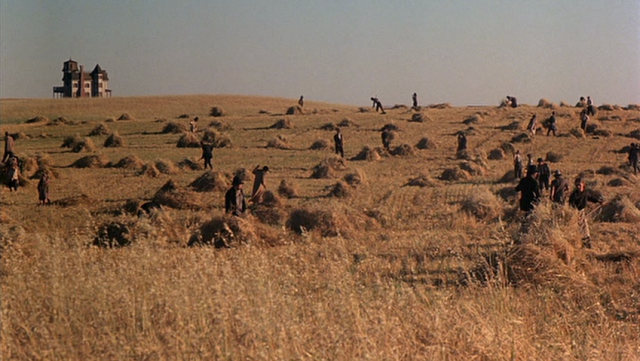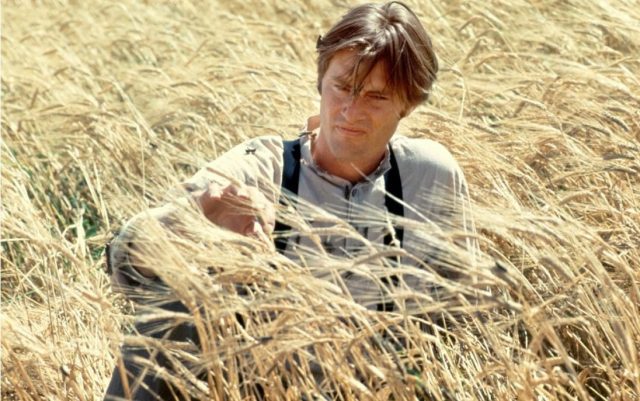
Sam Shepard gets involved in a complex love triangle in Terrence Malick’s Days of Heaven
DAYS OF HEAVEN (Terrence Malick, 1978)
BAMcinématek, BAM Rose Cinemas
30 Lafayette Ave. between Ashland Pl. & St. Felix St.
Friday, November 3, 4:30, 7:00, 9:30
Series runs November 3-9
718-636-4100
www.bam.org
BAMcinématek wishes Sam Shepard, who passed away in July at the age of seventy-three, a happy birthday with the ten-movie tribute “True West: Sam Shepard on Film,” running November 3-9. The Pulitzer Prize-winning, Oscar- and Emmy-nominated, Tony-winning actor, writer, director, and playwright was born Samuel Shepard Rogers IV in Illinois on November 5, 1943. His legacy includes such work as Steel Magnolias, Crimes of the Heart, Snow Falling on Cedars, and Black Hawk Down and such plays as Buried Child, Fool for Love, and Curse of the Starving Class. Ruggedly handsome and fiercely independent, Shepard leaves behind a vast legacy that ranged from the American West to Hollywood to downtown New York and beyond.
 Justifiably recognized as one of the most beautiful films ever made, writer-director Terrence Malick’s sophomore effort, Days of Heaven, is a visually breathtaking tale of love, desperation, and survival in WWI-era America. After accidentally killing his boss (Stuart Margolin) in a Chicago steel mill, Bill (Richard Gere) immediately flees to the Texas Panhandle with his girlfriend, Abby (Brooke Adams), and his much younger sister, Linda (Linda Manz). Because they are unmarried, Bill and Abby pretend to be brother and sister — evoking the biblical story of Abraham introducing his wife Sarah as his sibling — and get a job working in the wheat fields owned by a reserved, possibly ill farmer (Sam Shepard) who is instantly smitten with Abby. Soon a complex love triangle develops in which money, class, and power play a key role. As beautiful as the main characters are — Gere and Shepard particularly are shot in ways that emphasize their tender but rugged good looks — they are outshone by the gorgeous landscapes and sunsets photographed by Nestor Almendros (who won an Oscar for Best Cinematography) and Haskell Wexler, as well as Jack Fisk’s stunning art direction, all of which were directly inspired by Edward Hopper’s “House by the Railroad” and Andrew Wyeth’s “Christina’s World,” among other paintings. Like Stanley Kubrick’s Barry Lyndon, freezing nearly any frame will produce an image that could hang in a museum.
Justifiably recognized as one of the most beautiful films ever made, writer-director Terrence Malick’s sophomore effort, Days of Heaven, is a visually breathtaking tale of love, desperation, and survival in WWI-era America. After accidentally killing his boss (Stuart Margolin) in a Chicago steel mill, Bill (Richard Gere) immediately flees to the Texas Panhandle with his girlfriend, Abby (Brooke Adams), and his much younger sister, Linda (Linda Manz). Because they are unmarried, Bill and Abby pretend to be brother and sister — evoking the biblical story of Abraham introducing his wife Sarah as his sibling — and get a job working in the wheat fields owned by a reserved, possibly ill farmer (Sam Shepard) who is instantly smitten with Abby. Soon a complex love triangle develops in which money, class, and power play a key role. As beautiful as the main characters are — Gere and Shepard particularly are shot in ways that emphasize their tender but rugged good looks — they are outshone by the gorgeous landscapes and sunsets photographed by Nestor Almendros (who won an Oscar for Best Cinematography) and Haskell Wexler, as well as Jack Fisk’s stunning art direction, all of which were directly inspired by Edward Hopper’s “House by the Railroad” and Andrew Wyeth’s “Christina’s World,” among other paintings. Like Stanley Kubrick’s Barry Lyndon, freezing nearly any frame will produce an image that could hang in a museum.
The soundtrack is epic as well, composed by Ennio Morricone along with songs by Leo Kottke and Doug Kershaw (who plays the fiddler). It took two years for Malick and editor Bill Weber to assemble the vast amount of footage they shot into a comprehensible story, helped by the late addition of Manz’s character’s voice-over narration, but the results were well worth all of the time and effort. Days of Heaven came five years after Malick’s breakthrough debut, Badlands, and it would be another twenty years before his next film, The Big Red One, then seven more until 2005’s The New World. Days of Heaven kicks off the BAMcinématek series “True West: Sam Shepard on Film,” which runs November 3-9 and includes such other Shepard films that he either wrote and/or appeared in as Philip Kaufman’s The Right Stuff, Robert Altman’s Fool for Love, and Graeme Clifford’s Frances.
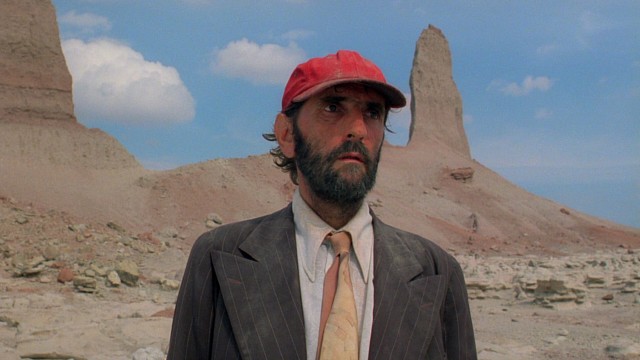
Harry Dean Stanton gives a staggering performance as a lost soul in Wim Wenders’s Paris, Texas, cowritten by Sam Shepard
PARIS, TEXAS (Wim Wenders, 1984)
Saturday, November 4, 2:00 & 7:45
www.bam.org
 Winner of both the Palme d’Or and the Critics Prize at the 1984 Cannes Film Festival, Wim Wenders’s Paris, Texas is a stirring and provocative road movie about the dissolution of the American family and the death of the American dream. Written by Sam Shepard and adapted by L. M. Kit Carson, the two-and-a-half-hour film opens with a haggard man (Harry Dean Stanton) wandering through a vast, deserted landscape. A close-up of him in his red hat, seen against blue skies and white clouds, evokes the American flag. (Later shots show him looking up at a flag flapping in the breeze, as well as a graffiti depiction of the Statue of Liberty.) After he collapses in a bar in the middle of nowhere, he is soon discovered to be Travis Henderson, a husband and father who has been missing for four years. His brother, Walt (Dean Stockwell), a successful L.A. billboard designer, comes to take him home, but Travis, remaining silent, keeps walking away. He eventually reveals that he is trying to get to Paris, Texas, where he has purchased a plot of land in the desert, but he avoids discussing his past and why he walked out on his wife, Jane (Nastassja Kinski), and son, Hunter (Hunter Carson, the son of L. M. Kit Carson and Karen Black), who is being raised by Walt and his wife, Anne (Aurore Clément). An odd man who is afraid of flying (a genuine fear of Shepard’s), has a penchant for arranging shoes, and falls asleep at key moments, Travis sets out with Hunter to find Jane and make something out of his lost life.
Winner of both the Palme d’Or and the Critics Prize at the 1984 Cannes Film Festival, Wim Wenders’s Paris, Texas is a stirring and provocative road movie about the dissolution of the American family and the death of the American dream. Written by Sam Shepard and adapted by L. M. Kit Carson, the two-and-a-half-hour film opens with a haggard man (Harry Dean Stanton) wandering through a vast, deserted landscape. A close-up of him in his red hat, seen against blue skies and white clouds, evokes the American flag. (Later shots show him looking up at a flag flapping in the breeze, as well as a graffiti depiction of the Statue of Liberty.) After he collapses in a bar in the middle of nowhere, he is soon discovered to be Travis Henderson, a husband and father who has been missing for four years. His brother, Walt (Dean Stockwell), a successful L.A. billboard designer, comes to take him home, but Travis, remaining silent, keeps walking away. He eventually reveals that he is trying to get to Paris, Texas, where he has purchased a plot of land in the desert, but he avoids discussing his past and why he walked out on his wife, Jane (Nastassja Kinski), and son, Hunter (Hunter Carson, the son of L. M. Kit Carson and Karen Black), who is being raised by Walt and his wife, Anne (Aurore Clément). An odd man who is afraid of flying (a genuine fear of Shepard’s), has a penchant for arranging shoes, and falls asleep at key moments, Travis sets out with Hunter to find Jane and make something out of his lost life.
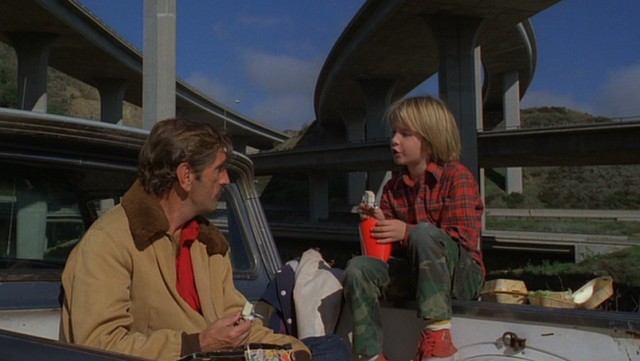
Travis (Harry Dean Stanton) and Hunter (Hunter Carson) bond while searching for Jane in Wim Wenders road movie
Longtime character actor Stanton (Repo Man, Wise Blood) is brilliant as Travis, his long, craggy face and sad, puppy-dog eyes conveying his troubled soul and buried emotions, his slow, careful gait awash in loneliness and desperation. The scenes between Travis and Jane are a master class in acting and storytelling; Stanton and Kinski (Tess, Cat People) will break your heart over and over again as they face the hardest of truths. Wenders and regular cinematographer Robby Müller use a one-way mirror to absolutely stunning effect in these scenes about what is hidden and what is revealed in a relationship. Wenders had previously made the Road Movie Trilogy of Alice in the Cities, The Wrong Move, and Kings of the Road, which also dealt with difficult family issues, but Paris, Texas takes things to another level. Ry Cooder’s gorgeous slide-guitar soundtrack is like a requiem for the American dream, now a wasteland of emptiness. (Cooder would later make Buena Vista Social Club with Wenders. Another interesting connection is that Wenders’s assistant director was Allison Anders, who would go on to write and direct the indie hit Gas Food Lodging.) A uniquely told family drama, Paris, Texas is rich with deft touches and subtle details, all encapsulated in the final shot. (Don’t miss what it says on that highway billboard.) Paris, Texas is screening November 4 at 2:00 and 7:45 in the BAMcinématek series “True West: Sam Shepard on Film.”
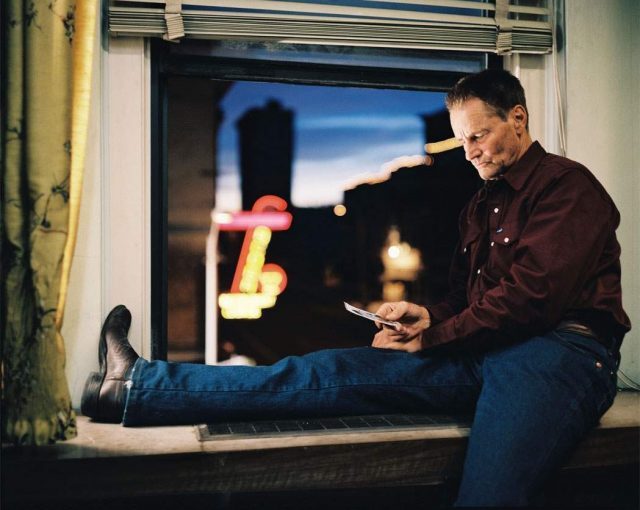
Sam Shepard wrote and stars in Wim Wenders underseen and underrated Don’t Come Knocking
DON’T COME KNOCKING (Wim Wenders, 2005)
Saturday, November 4, 5:00
www.bam.org
www.sonyclassics.com
 Reteaming with Sam Shepard for the first time since the indie classic Paris, Texas more than twenty years earlier, German director Wim Wenders continued his exploration of the American psyche with this dark comedy set in the wide-open prairie. The movie begins the way many Westerns end — with the hero riding away into the distance, but in this case it is the sunrise, not the sunset, signaling a new start. Shepard stars as Howard Spence, a former big-time movie star whose career has fallen apart in a whirlwind of drugs, alcohol, and women. After a wild night in his trailer, he takes off from the set of his latest film, being made in Moab, Utah (and directed by the great George Kennedy), and decides to disappear, first going home to Elko, Nevada, to see his mother (Eva Marie Saint), whom he hasn’t spoken to in thirty years, and then heading to Butte, Montana, to find an old love (Jessica Lange, Shepard’s real-life longtime partner at the time) — and perhaps some lasting meaning to his miserable, wasted life. Meanwhile, Sutter (Tim Roth), a detective who works for the bond company that financed the film, is after him, determined to bring him back to finish the picture. Gorgeously photographed by Franz Lustig (Wenders’s Land of Plenty, Palermo Shooting) and featuring a great soundtrack by T Bone Burnett, Don’t Come Knocking is a fascinating character study and a whole lot of fun. The excellent cast also includes Gabriel Mann, Sarah Polley, and Fairuza Balk as an offbeat trio representing the next generation. Don’t Come Knocking is screening November 4 at 5:00 in the BAMcinématek series “True West: Sam Shepard on Film.”
Reteaming with Sam Shepard for the first time since the indie classic Paris, Texas more than twenty years earlier, German director Wim Wenders continued his exploration of the American psyche with this dark comedy set in the wide-open prairie. The movie begins the way many Westerns end — with the hero riding away into the distance, but in this case it is the sunrise, not the sunset, signaling a new start. Shepard stars as Howard Spence, a former big-time movie star whose career has fallen apart in a whirlwind of drugs, alcohol, and women. After a wild night in his trailer, he takes off from the set of his latest film, being made in Moab, Utah (and directed by the great George Kennedy), and decides to disappear, first going home to Elko, Nevada, to see his mother (Eva Marie Saint), whom he hasn’t spoken to in thirty years, and then heading to Butte, Montana, to find an old love (Jessica Lange, Shepard’s real-life longtime partner at the time) — and perhaps some lasting meaning to his miserable, wasted life. Meanwhile, Sutter (Tim Roth), a detective who works for the bond company that financed the film, is after him, determined to bring him back to finish the picture. Gorgeously photographed by Franz Lustig (Wenders’s Land of Plenty, Palermo Shooting) and featuring a great soundtrack by T Bone Burnett, Don’t Come Knocking is a fascinating character study and a whole lot of fun. The excellent cast also includes Gabriel Mann, Sarah Polley, and Fairuza Balk as an offbeat trio representing the next generation. Don’t Come Knocking is screening November 4 at 5:00 in the BAMcinématek series “True West: Sam Shepard on Film.”
